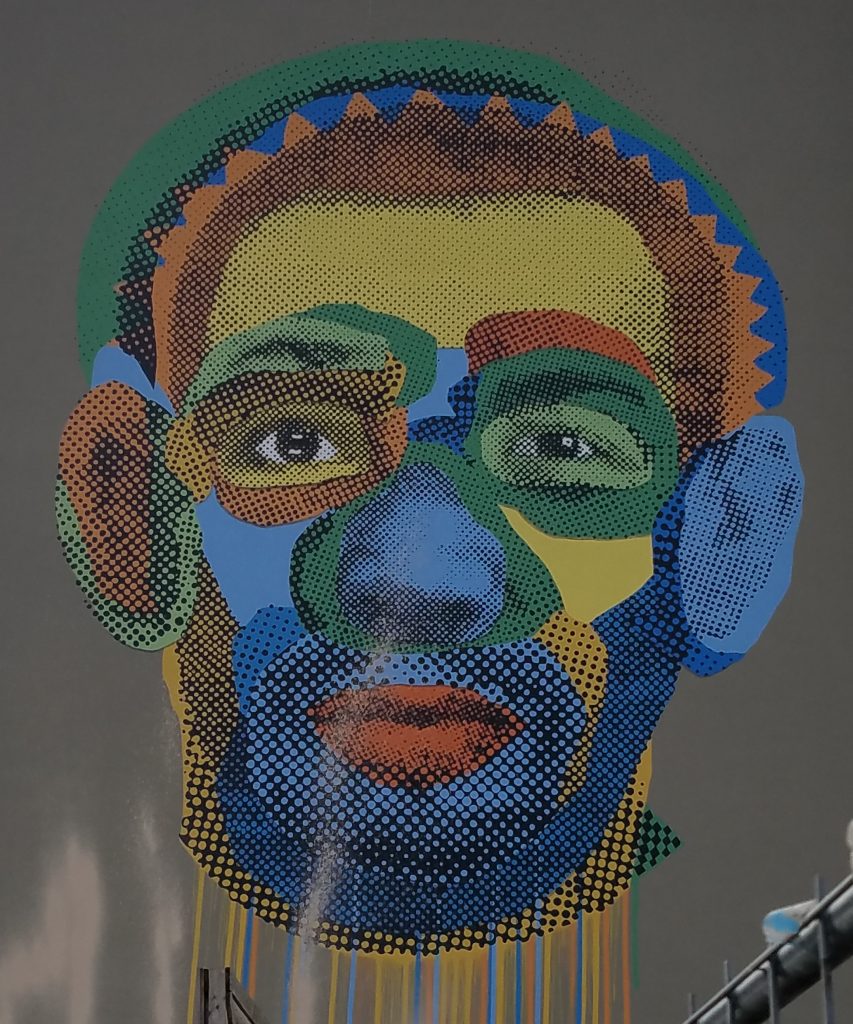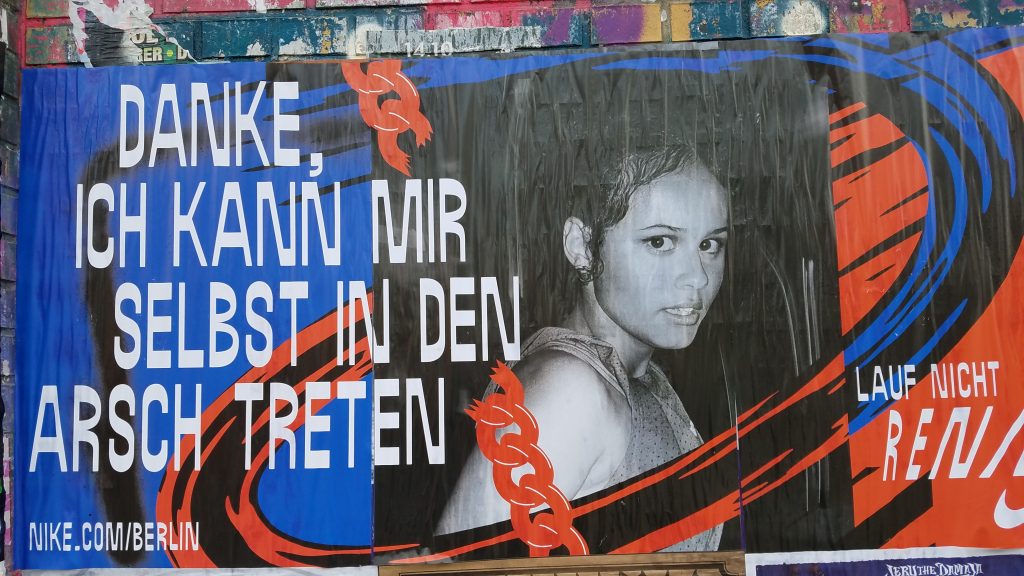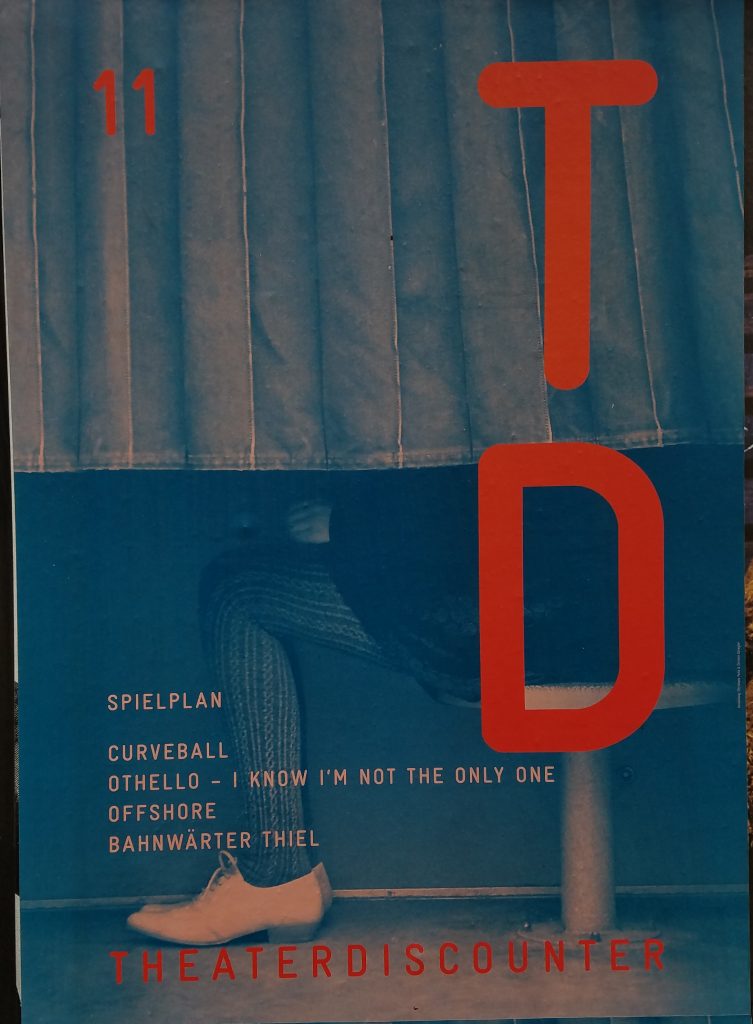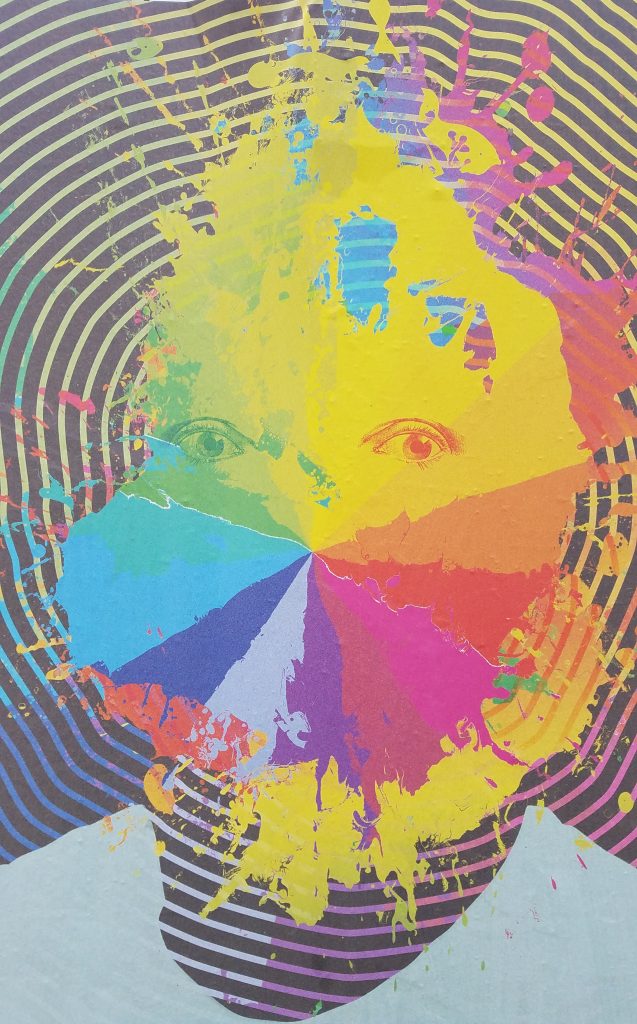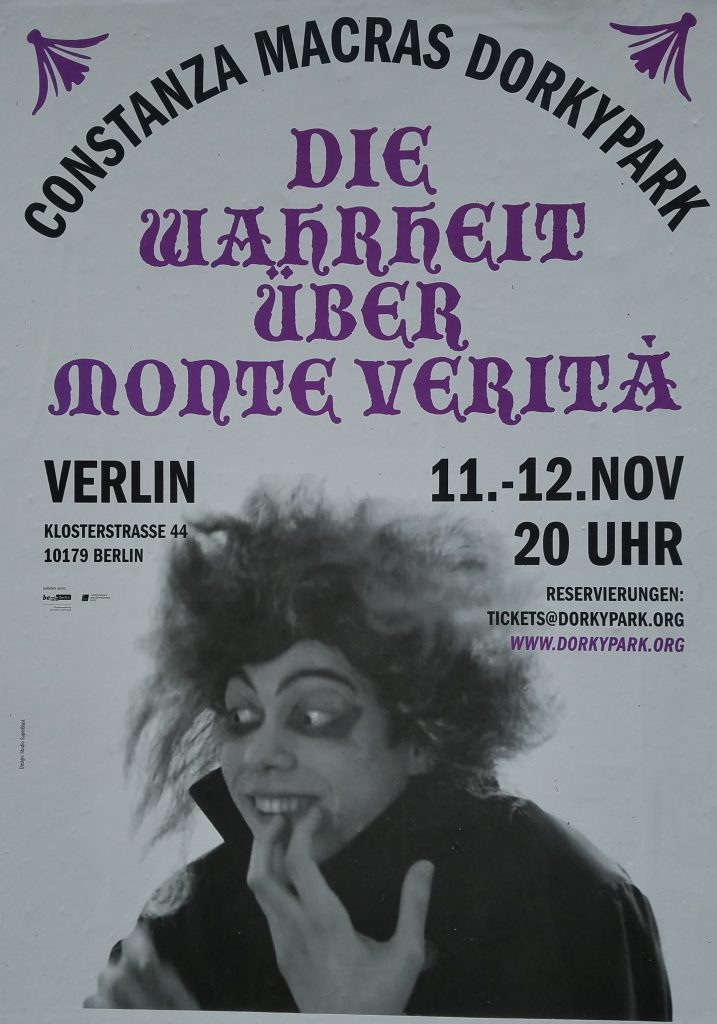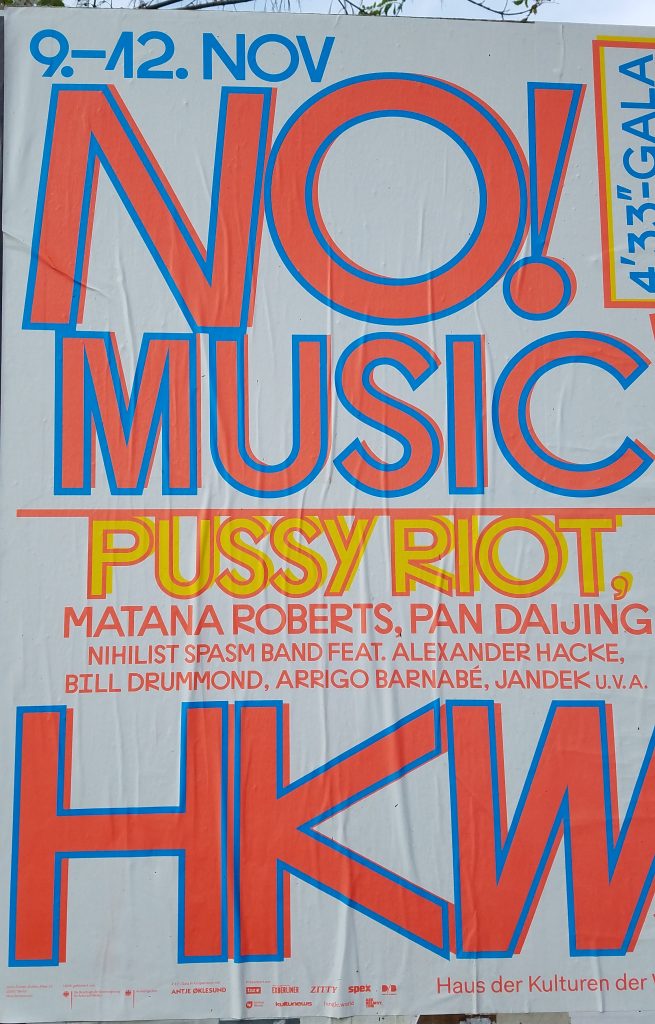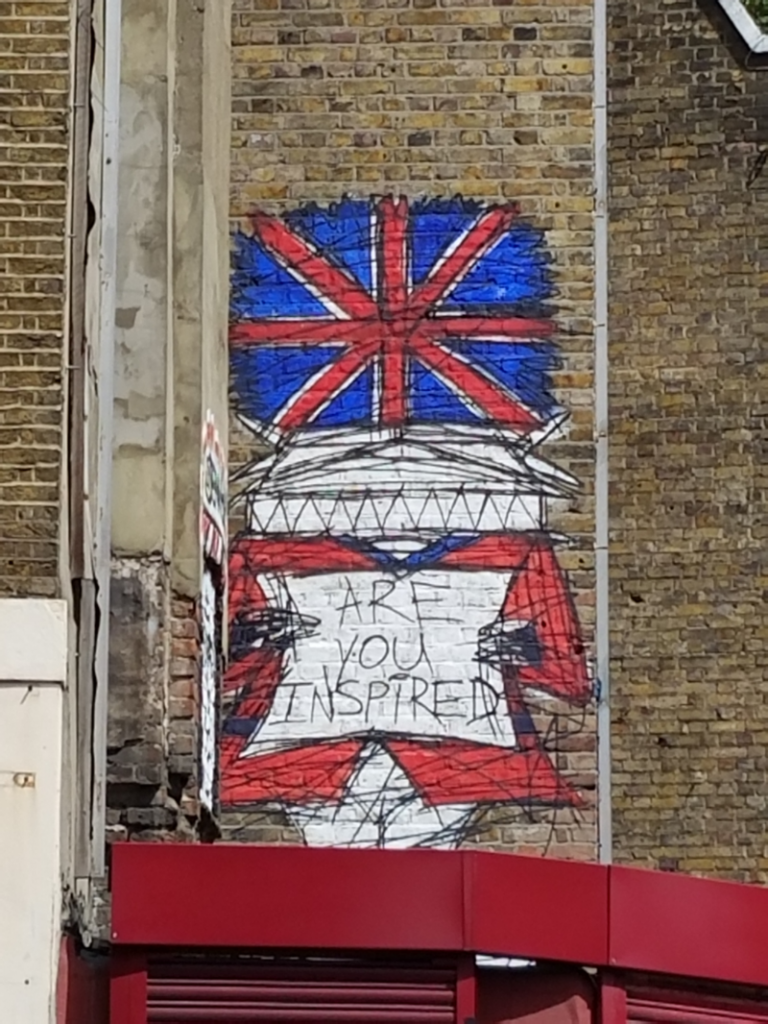One pleasure, in my book, one can glean traveling in a different country, is the sample of their culture one gets from their media. These days that is primarily television, newspapers and print advertising. Take my last post, for example, on Posters. Posters are both ubiquitous and populist. They are put up by bar bands (Bar Stool Preachers) and humongous, multi-national brands (Nike) but they provide a lens into the sensibilities of both the local district and larger culture in which they are erected.
Nearly every person, other than me, on the flight here from Frankfurt (45 minutes in the air) was reading a newspaper. I having already consumed the International Herald Tribune at the airport, the only English language paper on offer. These are true “broadsheet” papers here, other than the occasional tabloid (der Spiegle) so when all those in a “three across” row are reading, the leafs overlap and rustle. Now this avid digestion of the news may be due to the fact that Lufthansa, which dominates FRA the way that few American airlines dominate a particular airport, has racks of free copies liberally sprinkled throughout the airport, but many American airlines either place piles at their gates, or have carts on the planes. No, I think this is a cultural item, and it is encouraging.
But, as I don’t read German any better than I speak it, I didn’t delve into the papers much beyond an idle page-flip in the airport lounges.
So now we get to television. The set in my flat, a Sony, is connected to some sort of Free Satellite service, as is common across Europe. This one has no Internet component, however, which is also becoming common, so I have no access, for example, to YouTube, or Netflix. There are precious few choices in English, which shouldn’t shock. There’s a channel which airs BBC news for part of the day (not sure which, yet) and then reverts to scrambled MTV-HD other times (how one determines that MTV is scrambled is beyond me, but the telly assures me it knows).
So what does an American, with just a few memories of those four years “studying” German, watch on telly? Well, there’s the ever-present Bloomberg mix of business and news “Intelligence,” which, in these fraught times, is both unnerving and strangely welcome. Unnerving in how they smoothly and glibly finesse a question about tax avoidance (the Paradise Papers imbroglio) and yet pay attention to climate change (with Syria joining the Paris accord, only the US may be outside of it).
In this age when seemingly every institution of modern life, from the grocer on the corner to the websites we visit and the governments which surveil us, all want as much “Intelligence” about us as possible. Bloomberg, then, to us average, non-dues-paying Joes, gives us that ephemeral sensation of parity. Just for a moment, we know a thing or two about a Saudi crown prince that maybe he doesn’t know about us.
Or maybe that’s just me.
Then there’s the surfeit of wildlife shows, which are almost universal in that one needn’t, really, know what the narrator is saying to understand that that Tasmanian devil was trying to schtup that other devil (who seemed none too glad, and later, pregnant in the southern winter, just sulks in the cave dwelling). Animals schtupping is universal, so we easily overcome the language barrier and settle in as the animal-world voyeurs we all have been since those early petting zoo days (or is that just me, too?).
Oddly, most of the wildlife shows here are dubbed British or American episodes, rebranded into some new travelogue-ish scheme, which have their own books and other assorted follow-on products available for order. Given that the dubbing technique in the video is to mute the narrator, whom we can often see right on screen there, and slather the German language dialogue over the top, one is left to wonder; these books, is the original English-language text over-struck or Sharpie’d and then German text inserted?
In one particularly touching scene in an otherwise run-of-the-mill special on primates, the narrator, a casually dressed African-American gentleman, sits near the bush observing a mountain gorilla and its young, who are foraging and stripping some vegetation for a snack. The pappa gorilla ambles past, making a big show of ignoring the human, but the juvenile just can’t seem to pass by without an exploratory move. The young ape skitters over and, reaching out tentatively, grasps the man’s hand, as if to confirm the same-ness of these digital appendages. The narrator, overcome, says (barely audible in English) “Well that was amazing.” Over his voice, however, we hear a string of syllables which goes on so much longer that import martial arts films come to mind.
As with the wildlife shows, the plentiful bounty of police procedurals one finds on air here are most often poorly dubbed presentations of American, or more often British or French shows. Prime Suspect, Life on Mars and others proliferate. Every effort is made to completely erase the original dialogue and cover it with German. This strikes me as odd. In my experience it’s not at all unusual for European broadcasters to option each other’s programming, but it’s almost always subtitled, not dubbed. When I watch Forbrydelsen — the Danish show which was remade by Fox, for AMC, as The Killing — or any of a number of other, brilliant European programmes on British telly, they are always presented in their original language and subtitled. Not so here.
Last night, for example, while reading the New Yorker, I had on, in the background, a couple of episodes of the single-season British show Life On Mars, starring John Simms as a disoriented, time-traveling cop plopped down in a mid-’70s Manchester station house. A success in the UK, this somehow failed in a US remake, a couple years later, on ABC. In this German dubbed edition, in which evidence centred largely around team scarfs for Man United, the whole topic of team fealty seemed oddly detached.
So why is it that the Germans prefer dubbed to subtitled foreign programming? One is left to ponder. At first blush, it’s easy to assume that the length of German language words might preclude subtitling, without needing to skip text or fill the screen with it. The tendency, in German, to compound words together certainly does make for longer and longer strings of text, that’s for sure, but let’s take the example of the Danish/Swedish co-production Broen|Bron (Bridge) from 2011. The series opens with a body found on the Øresund bridge connecting Copenhagen to Malmö, right in the middle, so detectives from each city’s police forces, Danish inspector Martin Rohde (Rafael Patterson) and Swedish Saga Norén (Sofia Helin) must cooperate on the case. The characters, he a gruff, slovenly womanizer and she an autistic, precise, exacting, clueless to social cues and oblivious to common sexual mores, are meant to reflect each country’s perception of the other. Thus the entire show serves as a sort of split group social catharsis.
It’s a good show, as reflected by the fact that, after having shown it, subtitled, to warm reception, British and French networks Sky & Canal+ teamed up to produce their own version, The Tunnel, starring Stephen Dillane and Clémence Poésy in the British and French roles, as Karl Roebuck and Elise Wasserman, respectively, with similar cross-cultural stereotyping.
Likewise, FX remade the series as The Bridge, for American and Mexican audiences, with the American being the uptight one, casts Diane Kruger and Demián Bichir in the lead roles, again as stereotypes.
Interestingly, the original team wanted to set this on the bridge connecting Detroit to Toronto, rather than El Paso and Juarez, which leaves one wondering what the social contrast would be. No doubt the American would have been the rude one, which would go against the grain of FX’s parent company’s politics..
The reason I mention all of these is that there are at least four versions (a Russian/Estonian version was made, too) the Germans could have chosen to remake, and they chose not the original Danish/Swedish, but the Anglo-French. Why this one, one wonders? Is it that the Germans prefer tunnels to bridges? Or is it the ease of obliterating English and French dialogue (yes, in a first the original was bilingual) with German versus some difficulty doing the same vandalism to Danish and Swedish, or American English and Mexican Spanish?
Well, that’s the something borrowed, for sure. Here’s the something new: Crusti Croc Flips:

Crusti Croc Flips
These are like Cheetos or any other such extruded corn puff food, but what makes these stand out is the Erdnuss (peanut) variety. Imagine a low-sweetness version of that peanut-flavoured breakfast serial that you’ve seen other people’s kids eating (Puffins or Gorilla puffs, or Cap’n Crunch). They’re really quite good, but one feels there must be something wrong here. Rather than turning orange, one’s fingers feel a little… smudgy? Not sure how to describe it.
Well, I like them, so that’s what matters.



